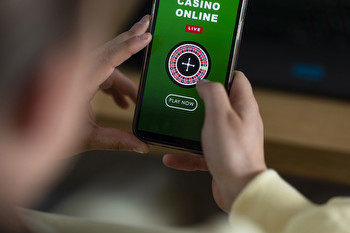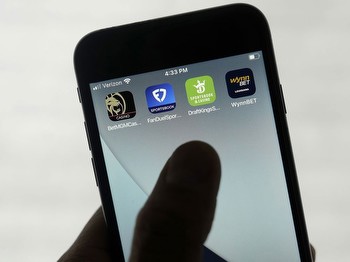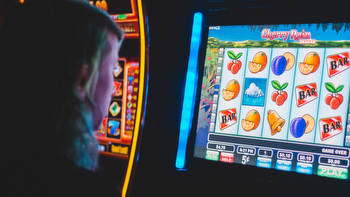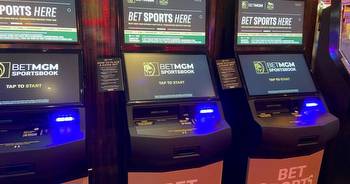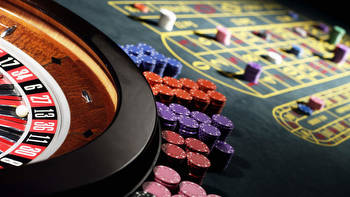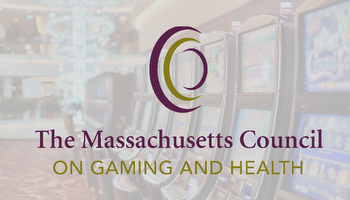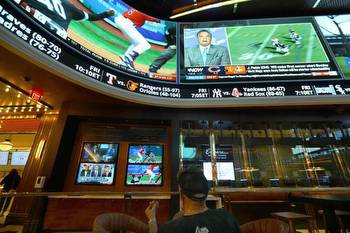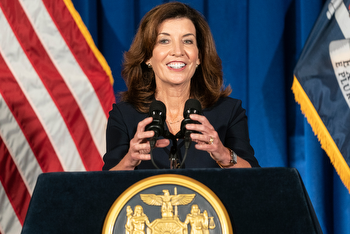Gambling problems in Mass. need addressing, public health experts say
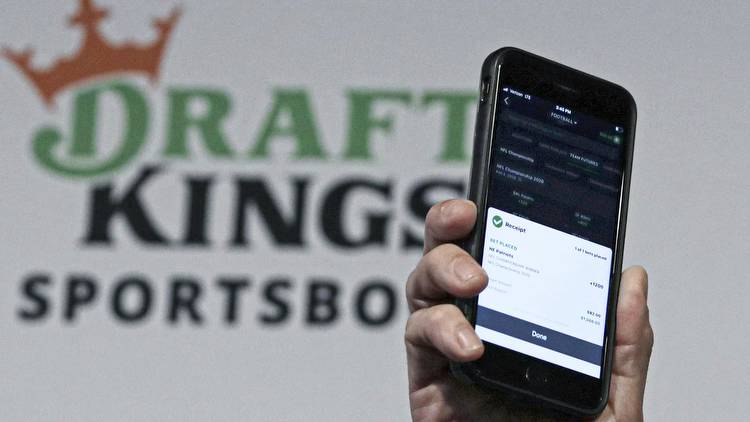
BOSTON — Advocates and researchers concerned with increased access to sports betting are urging lawmakers to implement a public health approach in raising awareness about the dangers of problem gambling.
They're also asking questions about the effectiveness of the state's current approach.
During the first three days of mobile sports betting in Massachusetts (March 10-12), more than 8.1 million geolocation transactions were made from more than 400,000 accounts across the six mobile operators, according to GeoComply, a company that provides the Massachusetts Gaming Commission with geolocation and fraud detection services.
Nearly 6% of the state’s population of about 7 million established unique online sports betting accounts, which is almost double the percentage of similar population-sized states.
In a webinar hosted March 15 by the Public Health Advocacy Institute, gambling experts said the expansion of mobile betting will cause significant public harm.
“This is not about being opposed to gambling or the gambling industry,” said Harry Levant, a public health advocate and addict in recovery with Stop Predatory Gambling, a nonprofit that speaks out against the predatory practices of gambling operators. “It is, however, being opposed to a series of courses that we're calling the gambling establishment, that has come together in the name of greed and avarice to pursue profit in ways that deliver a known addictive product to customers.”
Last summer, Massachusetts joined 35 other states in legalizing commercial sports betting. In January, the practice was legalized in-person at three state casinos: Encore Boston Harbor in Everett, Plainridge Park in Plainville and MGM Springfield. And as of March 10, residents can place bets through six mobile sportsbooks.
Since the launch of Massachusetts casinos in 2011, the state, with the aid of the Gaming Commission, has invested in the so-called Responsible Gaming Framework, which aims to guide gambling regulation and promote responsible gaming practices; inform gambling regulation in the state; and establish a public health trust fund that supports problem gambling prevention and mitigation programs and services.
Gambling products 'known to be addictive'
Mark Gottlieb, executive director of Public Health Advocacy Institute, argues the framework is a “business model” for the gambling industry.
“The products that are being sold by the industry are known to be addictive, and therefore are quite dangerous and can result in severe psychological damage and even suicide among those who become addicted to those products,” Gottlieb said. “The only way that the companies can be permitted to freely sell these products is by offering something in return.”
The state has several initiatives aimed at promoting responsible gaming and reducing gambling-related harm. One is GameSense, which provides tips, tools and referrals for responsible gaming. Another is PlayMyWay, a budget-setting tool for slot machine play.
Additionally, the Voluntary Self-Exclusion program allows participants to prevent themselves from visiting the gaming floor at all Massachusetts casinos for a predetermined length of time.
Richard Daynard, a distinguished professor of law at Northeastern University and president of the PHAI, said the mobile gambling products are “totally different” than casino-style gambling.
“It's not like smoking 10 or 15 or 20 cigarettes a day,” Daynard said from his research experience of the tobacco industry. He said repeat gambling behaviors maintain dopamine levels, and with the advent of mobile access, people can “get a whole bunch of hits a minute, or an hour, or many hits an hour.”
Levant said he designed the acronym “AAC” — access, action and chase — to inform the public that gambling products are “pushing constant access to the action of the product and chasing your losses.”
He added the “most dangerous” aspect of gambling is the legalization of micro-betting, or wagering on every pitch or shot within a game.
Gambling industry gets 'free hand'
Levant said the industry-sponsored model effectively calls for allowing the gambling industry a free hand in return for a promise to pay for treatment.
“It puts all this messaging out, telling people to be responsible," he said. "They're pushing the most addictive aspects of the product, and then shifting the burden on the individual to be responsible.”
Problem gambling is higher among sports bettors due to a wider range of opportunities, according to the MGC report. The report also showed that legalizing sports betting in the state may increase gambling-related harm, but the impact is likely to be modest because the participation levels remain low — 13% to 20% of the population.
GeoComply data showed that Massachusetts ranks fifth in the number of geolocation transactions, after New Jersey, Ohio, Pennsylvania and New York.
In Ohio, where sports betting has been legal since the beginning of January, the problem gambling hotline reports a 135% increase in calls from the last month before legalization to the first month after legalization, according to Ohio for Responsible Gambling.
“While I can't predict with certainty what's going to happen in Massachusetts, it's difficult to believe that it will be any different than what we've seen in every other state,” Levant said in an interview. “In every other state, there has been a huge increase in people struggling with gambling addiction, and problems related to gambling addiction. It is very logical and safe to expect that you are about to see a similar tsunami in Massachusetts.”
Levant said numbers from Ohio represent only people who are calling (for help with addiction), not those who haven't yet called.
“The responsible gambling narrative puts shame and stigma onto people who are suffering from a mental health disorder," said strategy director Will Prochaska of Gambling with Lives, a charity organization in the UK. "It stops them from reaching out for help, because they think it must be their own fault. It stops some professionals from offering help in the right way because the stigma is brought in to all of us.”
Matt Gaskell, a consultant psychologist and a clinical lead for addictions with the National Health Service Northern Gambling Service, said in an interview that gamblers have several disadvantages compared to people who are addicted to substances, alcohol and tobacco — such as secrecy and shame, making it difficult for them to come forward and seek help, and the mindset of gambling.
'Taken from the poor, given to the rich'
“The mindset is, the only way I can get out of this is to continue to gamble, and get a big win through normal routes,” Gaskell said. “If I've got tens of thousands of dollars of debt or hundreds of thousands of dollars in debt, then for the gambler, their mindset is to gamble (their way) out of this, so that can prevent them coming forward and accepting that the past is the past and to let that go.”
Jim Orford, emeritus professor of clinical and community psychology at the University of Birmingham, said gambling “has become something that is being taken from the poor and given to the rich.”
“We know that gambling contributes to inequality because in terms of percent of income, percent of wealth, that is lost to gambling, the relatively poor are contributing more than the relatively rich,” he said.
The first month of in-person sports betting in Massachusetts generated more than $25 million in wagers, with revenue of more than $2 million for sportsbooks and $300,000 in taxes for the state. Encore Boston Harbor had the highest handle, at $16.9 million and reported taxable revenue of just over $857,000. The state's tax revenue of $301,533.52 from sports betting is split into various funds, including the general fund and the Public Health Trust Fund, according to the MGC.
Gottlieb said the state 's "generating its revenue through suffering.”
“I am very skeptical of the notion that the social benefits through revenue generated to the state is sufficient to address the harm that these products cause,” Gottlieb said. “There's a tremendous cost and in lives, in families that are destroyed, and is not a fair trade-off.”
Gottlieb added the commission could revisit the decision to allow micro-betting in Massachusetts and take a public health approach by preventing harm before it happens.
“What we have to do to begin the public health response is to start with making the public more aware of the dangers and make them aware of how serious the repercussions can be from a gambling disorder,” he said. “Then begin to work with policymakers to put up those guardrails to begin to put the brakes on a little bit, because the expansion of this has been breathtakingly rapid (and) that may ultimately involve legislation.”








